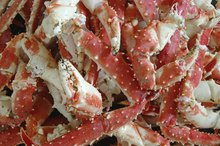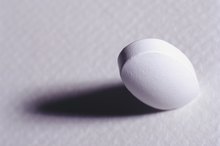What does fact checked mean?
At Healthfully, we strive to deliver objective content that is accurate and up-to-date. Our team periodically reviews articles in order to ensure content quality. The sources cited below consist of evidence from peer-reviewed journals, prominent medical organizations, academic associations, and government data.
- Office of Dietary Supplements of the National Institutes of Health: Zinc
- Linus Pauling Institute at Oregon State University: Zinc; Jane Higdon et al.; February 2008
The information contained on this site is for informational purposes only, and should not be used as a substitute for the advice of a professional health care provider. Please check with the appropriate physician regarding health questions and concerns. Although we strive to deliver accurate and up-to-date information, no guarantee to that effect is made.
Zinc for Nail Growth
Zinc is a vital nutrient required in small amounts by the human body. Many parts of the body require zinc, including the heart, brain, skin, hair and fingernails. The U.S. recommended dietary allowances are 8 mg for a woman and 11 mg for a man. Taking extra zinc when you do not have a deficiency is unlikely to have a beneficial effect. Consult your doctor before taking extra zinc.
Role of Zinc
Zinc is required for many of the biochemical reactions involved in the growth and division of cells. Types of cells that are growing and dividing rapidly, such as:
- the cells that produce skin
- hair
- fingernails
- need steady levels of zinc in order to promote healthy growth of these tissues
- according to the Linus Pauling Institute at Oregon State University [2](https://lpi.oregonstate.edu/mic/minerals/zinc 'inline-reference::Linus Pauling Institute at Oregon State University: Zinc; Jane Higdon et al
; February 2008').
Zinc Deficiency
Minerals for Fingernails and Fine Hair
Learn More
When a zinc deficiency occurs, symptoms can appear in many different parts of the body. Because rapidly growing cells need a constant supply of zinc, these rapidly dividing cells are often among the earliest to exhibit symptoms of a zinc deficiency. In addition to hair loss and skin conditions like psoriasis and dermatitis, a zinc deficiency can result in the appearance of white spots or flecks on the fingernails, reports the University of Maryland Medical Center. A zinc deficiency may also cause slow nail growth or nail splitting, according to Nail-Care-Tips.com 4.
- When a zinc deficiency occurs, symptoms can appear in many different parts of the body.
- In addition to hair loss and skin conditions like psoriasis and dermatitis, a zinc deficiency can result in the appearance of white spots or flecks on the fingernails, reports the University of Maryland Medical Center.
Zinc and Nail Growth
If you have a zinc deficiency that is causing slow growth or abnormal discolorations of your fingernails, then taking a zinc supplement to raise levels of zinc in your body will probably improve the appearance and growth of your fingernails. Making sure you consume enough zinc to avoid a zinc deficiency can help to prevent slow growth and splitting or discoloration of the fingernails, advises Nail-Care-Tips.com, but there is no evidence that taking zinc when you do not have a deficiency will improve the growth or appearance of your nails 4.
Foods Rich in Zinc
Side Effects of Too Much or Not Enough Zinc
Learn More
Consuming foods that contain high levels of zinc can help to ensure you do not develop a zinc deficiency. Oysters contain extremely high levels of zinc, and one serving of oysters provides over 500 percent of the daily required intake, reports the Office of Dietary Supplements of the National Institutes of Health 1. Other types of seafood and many meats also contain significant amounts of zinc. While some nuts, legumes and whole grains also contain zinc, the zinc found in plants is not easily absorbed by the human body.
- Consuming foods that contain high levels of zinc can help to ensure you do not develop a zinc deficiency.
- While some nuts, legumes and whole grains also contain zinc, the zinc found in plants is not easily absorbed by the human body.
Related Articles
References
- Office of Dietary Supplements of the National Institutes of Health: Zinc
- Linus Pauling Institute at Oregon State University: Zinc; Jane Higdon et al.; February 2008
- Healthfinder.gov: Health Tip: Don't Ignore Fingernail Abnormalities
- Nail-Care-Tips.com: ail Growth – Important Diet and Vitamins
- Mayo Clinic Laboratories, Test ID ZNS, Zinc, Serum
- Nakamura H, Sekiguchi A, Ogawa Y, Kawamura T, Akai R, Iwawaki T et al. Zinc deficiency exacerbates pressure ulcers by increasing oxidative stress and ATP in the skin.J Dermatol Sci. 2019 Jul 12. pii: S0923-1811(19)30197-5. doi: 10.1016/j.jdermsci.2019.07.004. [Epub ahead of print]
- National Institutes of Health, Office of Dietary Supplements, Zinc, Fact Sheet for Health Professionals
Writer Bio
Matthew Busse has pursued professional health and science writing since 2007, writing for national publications including "Science Magazine," "New Scientist" and "The Scientist." Busse holds a doctorate in molecular biology from the University of California-San Diego.









